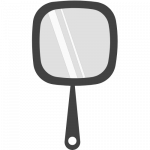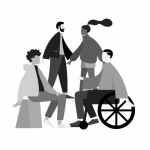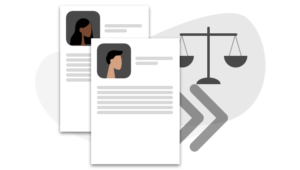Common Recruitment Biases
Bias is a prejudice in favour of or against a thing, a person or a group of people. Everyone has both conscious and unconscious biases. Our unconscious beliefs can often actually conflict with conscious values, That’s why it’s really important to become more aware of what they might be so we can start breaking old belief systems once we start noticing them.
Biases and stereotypes creep into our decision-making processes every day. We make assumptions about people all the time and recruitment is one area where subjectivity and bias can REALLY impact our workforce, culture and societal norms.
Here are our top five biases to be aware of:
 1. Contrast
1. Contrast
This is where we can fall into comparing each CV/ interview to the one that came before it. We judge whether or not the person in front of us did as well as the person that came before them. We should be focussed on the skills and attributes each individual has to those required for the job (not those of the person who came directly before them).
 2. Beauty
2. Beauty
Did you know that someone unattractive is more readily blamed for a crime than someone attractive? And criminals that are considered unattractive usually receive a 50% longer jail time then attractive criminals? Like affinity bias this is seen a lot in recruitment, men & women get hired based on stereotypical roles and on who we stereotypically think looks like a receptionist, computer programmer, CEO etc or who has had the role previous to them. Whilst attractive men and women are more likely to be hired, very attractive women are less likely to be hired!
 3. Affinity
3. Affinity
This bias occurs when we see someone we feel we have an affinity or connection with e.g. we attended the same college, shared interests or they remind us of someone we know and like. We naturally want to select those that we feel a connection with and will tend to hire them on culture fit rather than based solely on skills and experience. This contributes to why we get clones in certain departments.
 4. Halo Effect
4. Halo Effect
This is when we make an immediate judgement in a positive light (about a person) and assume ambiguous information based on this. For example, hiring someone based on a recommendation from someone you like, you could assume they’ll be the same as them i.e. motivated, positive and dedicated but of course they could be the opposite! Like beauty bias, with halo effect we can also view someone who is attractive as likely to be successful and popular as we have a ‘beauty is good’ bias in our (Western) culture.
 5. Horns Effect
5. Horns Effect
As you may have guessed this is the opposite to halo effect, when our immediate judgement (about someone) has a negative connotation. A great example of this in the hiring process is with names, research shows that people with Chinese, Indian or Pakistani-sounding names are 28% less likely to be invited to an interview than candidates with English-sounding names. Even when their qualifications are the same. (Druthers Search) Think about how you would make assumptions about someone with the following names; Diamond, Rupert, Tyrone, Lou-Lou, Ganesh, Chang, Dave?
We recommend that everyone, especially those in hiring / recruitment roles undertake unconscious bias training to become aware of your own biases and the effect they have on you personally, in the workplace and wider society.
